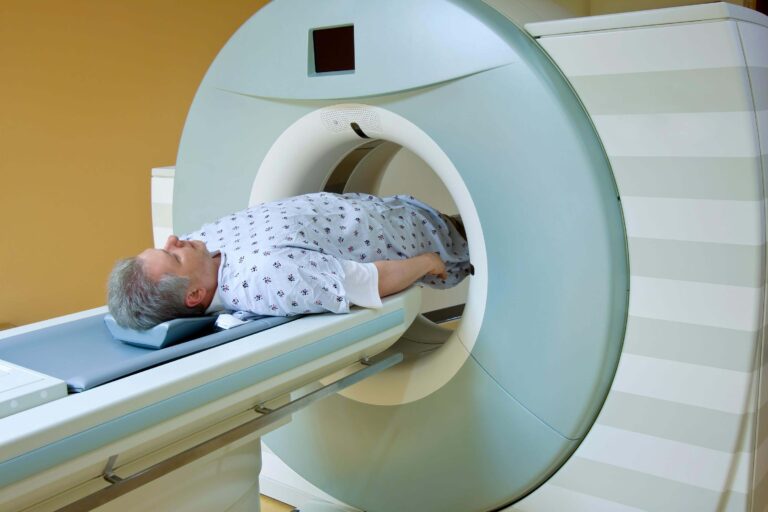Perhaps nothing is more concerning than feeling like there is something wrong with your heart. If you are having a medical emergency, dial 9-1-1.
If you aren’t having an emergency, and you feel persistent symptoms like chest pain, fatigue, or shortness of breath, you may have a heart blockage. Your medical provider may suggest you have a CT scan to find out. Don’t wait, get checked out.
Early detection of heart blockages
Early detection of a heart blockage is crucial for a positive outcome. There are many ways heart blockages can be detected. Begin with a regular checkup and tell your medical provider you’ve been having issues with your heart.
They may conduct an electrocardiogram (EKG) which can detect irregularities in your heart’s rhythm, which may be the result of a blockage. Also, they may ask you to take a stress test to see how your heart performs during different levels of physical activity. An ultrasound of your heart (echocardiogram) can help provide images of the heart’s structure and how it functions, which may identify a blockage.
Many times, your provider will advise you to get a CT scan of your heart, which can provide detailed images of the arteries, which can reveal blockages. Blood tests can tell if you have high levels of LDL cholesterol and C-reactive protein, which can indicate an increased risk of a blockage. Sometimes medical providers will advise coronary angiography, an invasive procedure in which a contrast dye is directly injected into the arteries to show any blockages.
What causes a heart blockage?
In simple terms, when your arteries clog up with fatty tissue (cholesterol or other substances), a blockage may occur, disrupting the flow of blood to the heart. Blocked arteries are the results of atherosclerosis (when fat, cholesterol, calcium and other substances build up in your arteries, the blood vessels that carry oxygen-rich blood throughout your body).
This can cause different types of heart disease, such as angina or even a heart attack. Although genetics and age play a role, poor diet, smoking, lack of exercise, high blood pressure, high cholesterol and diabetes are all factors which can lead to a blockage in the heart.
Why is early detection of a heart blockage crucial to my health?
Heart disease is by far the top cause of death in the United States and elsewhere, so it is crucial a blockage be detected as early as possible. A healthy working heart is crucial to a healthy life.
What happens when blockages go undetected or untreated?
Undetected or untreated heart blockages can cause very serious health complications. Initially the blockage can cause angina or chest pain. A complete blockage of blood flow can cause a heart attack (myocardial infarction), which can result in permanent damage to the heart muscle and could be potentially fatal. Chronic untreated blockages can weaken the heart over time leading to heart failure.
Blockages can also disrupt the electrical signals in the heart causing arrhythmias (abnormal heart rhythms). Sometimes, blood clots in the heart can travel to the brain, causing a stroke. In some cases, untreated blockages can lead to sudden cardiac arrest, where the heart stops beating and immediate life-saving treatment is required. Coronary artery disease often develops over decades and symptoms may go unnoticed until a significant blockage causes problems or a heart attack occurs.
How a CT scan diagnoses a heart blockage
One of the most important and useful tools medical providers have in diagnosing heart blockages are CT scans. Advances in medical technology and CT scans have made it possible for earlier and more accurate diagnoses, helping prolong and save lives.
How does a CT scan visualize arteries and blockages?
A CT scan looks at the arteries that supply blood to the heart. It uses X-rays to produce cross-sectional images of the heart and its blood vessels. The CT scanning machine takes a series of X-ray beam images around the heart, providing digital data. A computer processes the data to create cross-sectional images (or slices) of the heart. To enhance the images, sometimes a contrast material (iodine-based dye) is injected into the bloodstream.

Why is a CT scan one of the recommended methods for diagnosing heart blockages?
Over the years, CT scans have been proven to be a valuable diagnostic tool for assessing the health of arteries and detecting heart blockages and other vascular health issues.
How accurate are CT scans in detecting heart blockages, compared to other imaging studies?
CT scans are very accurate for finding heart blockages. In fact, a comprehensive study by John Hopkins showed that overall, non-invasive CT angiograms accurately detected or ruled out artery blockages in 91 percent of patients, compared with 69 percent for stress testing.
What to expect during your CT scan
As we all know, some medical procedures can be unpleasant. A CT scan, however, is non-invasive and requires very little time to perform. Here’s what you can expect during the procedure.
Are there any preparations required before undergoing the scan?
Before the scan, it is important for you to let your medical provider know about any medical conditions you have, any allergies you have, or medications you are taking. Depending upon the type of CT scan, you might be asked to fast for a few hours before the procedure, especially if the scan involves contrast dye.
Some scans may require you to drink the contrast dye, while others will be given through an IV (intravenously) or injected. Before the procedure, it’s always a good idea to remove all jewelry, eyeglasses or clothing with metal zippers or fasteners which may interfere with the scan.
What should I expect from a CT scan for heart blockages?
During the scan, you’ll lie on a table that slides into a donut-shaped scanner, and while the procedure is painless, you may hear humming or buzzing noises. The CT scan will provide your medical provider with a detailed overview of your heart and its function and whether or not there are any blockages. This will help the provider form a more accurate treatment plan for you and your heart.
How long does the scan typically take? Is there any pain or discomfort?
A CT scan usually takes only 15-30 minutes. If you are having a scan with contrast dye, there may be some minimal discomfort when the dye is injected, but this is unusually well tolerated. You ‘ll be asked to hold your breath for brief periods of time during the scanning.
Understanding your results
Waiting for your CT scan results can be very difficult. This is natural, but try and relax and remember you took action to help you live a longer, more healthy life. Here are a few things about CT scan results to help you prepare.
What do normal and abnormal CT scan results look like?
A normal CT scan of the heart will show clear, well-defined arteries. Abnormal results can vary but can appear as areas of increased density (blockages) or other masses, tumors or abnormalities. It is essential for your medical provider to interpret the results in terms and language you can understand. Do not be afraid to ask questions.
How do healthcare providers use the CT scan results to determine next steps for heart blockage?
If there is a blockage, the CT scan will help the provider gauge the degree of the blockage which will help them prepare a treatment plan for you. Treatment options may be medication, angioplasty, or coronary artery bypass surgery.
What happens next if my provider is concerned about my CT results?
If your healthcare provider is concerned about your CT scan results, they may recommend additional testing or imaging to gather more information. In some cases, the provider may refer you to a specialist for further evaluation.
If the CT scan reveals a medical condition, your healthcare provider will work with you to develop a treatment plan. This may include medications, surgery, therapy, or other treatments. Your provider will schedule follow-up appointments with you to monitor your progress and adjust your treatment plan as needed. Remember, ask questions. It’s your body, you need to know.
How to schedule a CT appointment with us
Reach out to us at American Health Imaging, and we’ll help you schedule an appointment at an imaging center near you, today.
We’re here to help you get the answers you need.
Frequently asked questions
Why is early detection of a heart blockage crucial to my health?
Early detection of a heart blockage can prevent severe complications and improve overall prognosis.
What happens if a heart blockage goes undetected or untreated?
Undetected or untreated blockages can lead to heart attacks, heart failure, or other life-threatening conditions.
How does a CT scan help in visualizing blockages in my arteries?
A CT scan uses X-rays to produce detailed images of arteries, allowing healthcare providers to see any blockages.
Why do doctors often recommend CT scans for diagnosing heart blockages over other methods?
CT scans are one of the most accurate and non-invasive methods for diagnosing heart blockages compared to other imaging studies.
Do I need to prepare in any specific way before undergoing a CT scan for heart blockages?
Yes, certain preparations might be required, such as fasting, depending on the specific protocol your healthcare provider has requested.
What should I anticipate during a CT scan for heart blockages?
During the scan, you’ll lie on a table that slides into a tunnel-shaped scanner, and while the procedure is painless, you may hear humming or buzzing noises.
How do healthcare providers interpret normal and abnormal results from a CT scan of the heart?
A radiologist will supply your healthcare provider with a written report of their interpretation of your images. Your healthcare provider will also receive a copy of the images to review
If my CT scan results raise concerns, what's the next step?
If your CT scan results are concerning, your healthcare provider will discuss potential next steps, which may include further testing, medications, or interventions.
